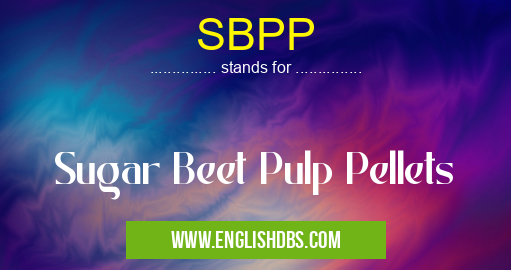What does SBPP mean in UNCLASSIFIED
SBPP stands for Sugar Beet Pulp Pellets. It is a type of livestock feed made from the dried pulp of sugar beets. SBPP is a high-fiber, low-protein feed that is often used as a supplement for cattle, sheep, and goats.

SBPP meaning in Unclassified in Miscellaneous
SBPP mostly used in an acronym Unclassified in Category Miscellaneous that means Sugar Beet Pulp Pellets
Shorthand: SBPP,
Full Form: Sugar Beet Pulp Pellets
For more information of "Sugar Beet Pulp Pellets", see the section below.
SBPP Meaning in MISCELLANEOUS
SBPP is classified as a MISCELLANEOUS term because it does not fit into any specific category. It is a unique term that is used to describe a specific product.
SBPP Full Form
The full form of SBPP is Sugar Beet Pulp Pellets.
What Does SBPP Stand For?
SBPP stands for Sugar Beet Pulp Pellets. It is a type of livestock feed made from the dried pulp of sugar beets. SBPP is a high-fiber, low-protein feed that is often used as a supplement for cattle, sheep, and goats.
Essential Questions and Answers on Sugar Beet Pulp Pellets in "MISCELLANEOUS»UNFILED"
What are Sugar Beet Pulp Pellets (SBPP)?
SBPP are a byproduct of sugar beet processing, made from the dried and pelleted pulp of sugar beets. They are a high-fiber feed ingredient used in animal nutrition.
What are the nutritional benefits of SBPP?
SBPP are rich in:
- Fiber (up to 20%)
- Pectin
- Minerals (calcium, magnesium, potassium)
- Vitamins (B vitamins)
How are SBPP used in animal feed?
SBPP can be incorporated into feed rations for various animals, including cattle, sheep, goats, and horses. They provide roughage, promote digestive health, and improve satiety.
What are the advantages of using SBPP in animal feed?
Using SBPP in animal feed offers several advantages:
- High fiber content aids in digestion and prevents digestive issues
- Pectin acts as a prebiotic, supporting a healthy gut microbiome
- Minerals and vitamins enhance animal health and performance
- Relatively low cost and widely available
Are SBPP safe for all animals?
While SBPP is generally safe, it is important to consult with a veterinarian or nutritionist to determine the appropriate amount and form for specific animal species and ages.
How can I tell if SBPP is of good quality?
Good quality SBPP should have a consistent brown color, a pleasant molasses-like smell, and no mold or spoilage. It should also be free from excessive dust or foreign material.
Final Words: SBPP is a type of livestock feed that is made from the dried pulp of sugar beets. It is a high-fiber, low-protein feed that is often used as a supplement for cattle, sheep, and goats. SBPP is a valuable source of nutrients for livestock and can help to improve their overall health and productivity.
